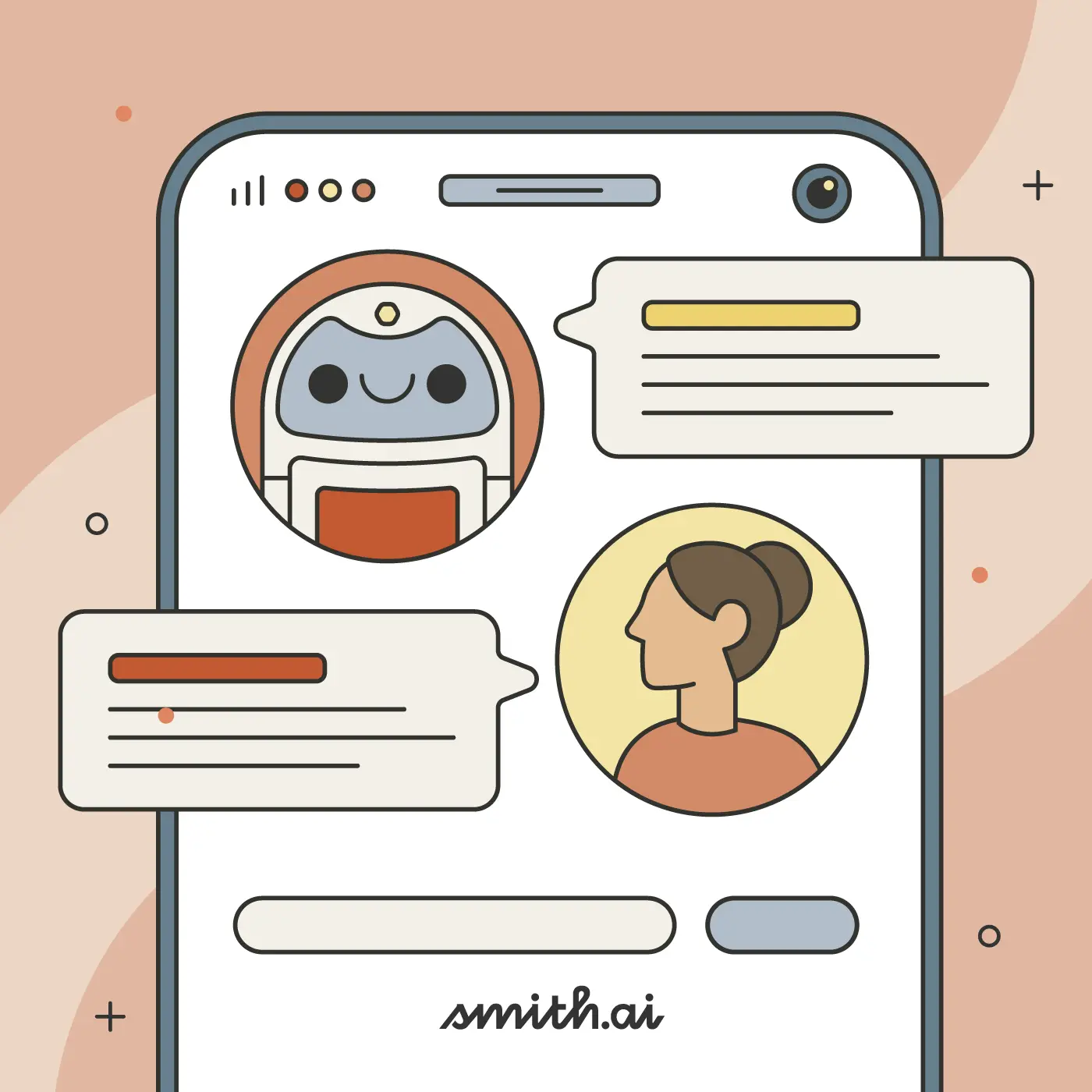What Is Conversational AI? Benefits + Examples

Imagine solving complicated customer issues in seconds without lifting a finger or answering a phone call. Is it a dream? No, it's the power of conversational AI.
Artificial intelligence is booming in marketing, praised for delivering advanced solutions and streamlining company processes. Many businesses currently benefit from the power of AI as they work to optimize operations and sales processes. After implementing AI software to automate or improve marketing and sales tasks, 80% percent of users experienced an increase in lead generation, while 77% saw a direct boost in conversions.
Conversational AI is a machine learning software designed to answer customer queries and solve their issues quickly and efficiently. Smith.ai understands if technology isn’t your company’s strong suit, our AI-powered live agents can do the work for you to improve your customer engagement and lead generation.
Below, we’ll give you the full scope of conversational AI, its real-world applications, and how Smith.ai integrates this technology to improve your workflows.
What is conversational AI?
Conversational AI is a form of machine learning software that imitates human conversation to answer and solve customer inquiries naturally.
It’s a form of artificial intelligence that allows computers to interact with humans conversationally.
Software that may use conversational AI includes:
- Virtual assistants: Virtual assistants are AI-powered programs that can increase and support productivity by setting calendar reminders, making calls, conducting data analysis, and delivering accurate results for user searches through text or voice recognition.
- AI chatbots: AI chatbots or conversational agents provide customer support for queries, streamline tasks, schedule appointments, and perform as virtual assistants, helping to manage daily operations.
- Voice-activated devices: Voice-activated systems perform tasks through verbal commands. The learning algorithms allow AI to recognize and interpret human voices without manual intervention.
- Customer service automation: AI automation services vary from call routing, pre-programmed query responses, data collection, tracking orders, reminder alerts, scheduling, and other tasks that do not require human assistance.
- Business intelligence (BI) and analytics: Business intelligence allows companies to extract information from the platform to enhance user engagement, make data-driven decisions, and improve sales and customer acquisition processes.
Typical queries a user might ask a chatbot include, "Looking for business resources" or "Where can I find my billing information?" To answer these questions, the AI would sort through your existing content to provide an accurate response with natural speech and tone. Conversational AI can be programmed to engage with customer needs and learn on the go to vet qualifying leads before forwarding them to the sales team.
How conversational AI works
Conversational AI technologies scan and store vast amounts of text and speech data in their databases. Advanced algorithms like machine learning (ML) and natural language processing (NLP) power conversational AI, reinforcing its learning capabilities to process and comprehend how to respond more appropriately and naturally to customer inquiries like a live human being.
Algorithms that power conversational AI include:
- Machine learning (ML): Machine learning powers conversational AI through a series of algorithms that use computerized methods to learn and process how to perform tasks without programming.
- Natural language processing (NLP): Natural language processing is a technique that powers AI by analyzing syntax, context, and nuances to grasp the framework and meaning of words in a language. Machine learning algorithms use this knowledge to teach AI software how to perform and solve various tasks.
Conversational AI technologies can automate tedious or repetitive tasks like managing customer service issues, providing instant responses to user queries, analyzing consumer data for personalization, processing orders, scheduling appointments, and more.
By leveraging conversational AI technologies — like chatbots, as a prime example — businesses can enhance customer interactions with immediate responses and focus on improving customer satisfaction.
Benefits and challenges of conversational AI
Conversational AI simplifies time-consuming and mundane tasks prone to human error or miscommunication. Through automation and natural language processing, customers receive efficient and human-like responses to their questions, preventing response delays and increasing customer satisfaction.
This works particularly well with lead generation or lead capture. Brands can also maximize scalability by automating their booking appointments and increasing capacity for more client bookings and demos.
Benefits of conversational AI
Conversational AI offers several benefits for businesses, including:
- Customer satisfaction: You can deliver 24/7 customer support, task automation to reduce human error, multilingual assistance, and individualized recommendations based on user patterns and preferences.
- Scalability: Chatbots and virtual assistants can handle multiple customer interactions at once. These features allow businesses to aid customer support and scale conversion rates immediately.
- Cost savings: AI eliminates the need for agents or operators to be physically present at all times, lowering costs and increasing efficiency.
- Data collection and analysis: Data analysis offers insights into client preferences, activity trends, and customer service roadblocks. These insights allow businesses to make data-driven decisions to enhance their goods and services.

Challenges of conversational AI
While conversational AI offers numerous benefits, it also presents some challenges:
- Accuracy and understanding: Language can be ambiguous and context-dependent. Conversational AI chatbots may need help conveying natural language nuances.
- Handling complex interactions: Complex interactions like interpreting human intent, troubleshooting tech issues, or emotional situations may present obstacles for conversational AI systems to understand user needs. These are examples of when it’s best to have a live human agent intervene.
- Privacy and security: Some worry about data privacy against hackers since conversational AI platforms deal with sensitive user information. Ensuring the ethical use of conversational AI and protecting user information is of utmost importance.
- User apprehension or frustration: Users may be hesitant about interacting with conversational AI based on cultural experiences, data security, ethics, misinformation, and lack of human interaction.
- Maintenance: Conversational AI platforms require ongoing maintenance to remain relevant and compliant with industry trends, adapt to user needs, and integrate with new technologies and language evolution.
Real-world examples of conversational AI in action
Conversational AI has already made significant strides in various industries. Here are a few real-world examples showcasing its impact:
- Conversational business intelligence (BI) apps: Conversational BI combines conversational intelligence AI with data analytics capabilities. Users can interact with these applications, like talking to a computer, and get results from data displays and discussions.
- Customer service automation: Many businesses use conversational AI chatbots to automate customer support. These chatbots can handle frequently asked questions, provide product recommendations, and assist customers in real-time.
- Health care applications: Conversational AI offers virtual assistance and support in health care. Applications like Ada Health use conversational AI to determine symptoms, provide telehealth services, and recommend appropriate actions.
- Banking: Banks utilize online AI chatbots to handle complicated requests and accurately respond to user search queries. AI helps minimize banking errors through wealth management, expense tracking, and transaction records.
- Virtual assistants: Virtual assistants like Amazon's Alexa use conversational AI to understand user commands and perform tasks. These assistants can answer questions, set reminders, play music, and control smart devices. They have become an integral part of many households worldwide.
- Text-to-speech software: This software is useful for speaking aloud to create audiobooks or give instructions, caption and text translation, transcribing, and lectures.
- NLP capabilities: In e-commerce, conversational AI enables personalized recommendations and product selection experiences. These conversational intelligence features deliver recommendations and text translation to accurately understand user intent, context, and sentiment.
How to choose a conversational AI platform
A conversational AI platform makes a major difference for brands needing extra support to manage large customer service databases, accurately track user data, and provide quality support services. Agents use AI platforms featured with voice assistants, automated answering services, lead screening, website chat, and more to improve and manage sales outreach.
Businesses must consider company goals, consumer engagement, and whether the need meets demand to choose the right conversational AI platform. The last thing you want is to invest in conversational AI for little to no returns on your investment.

Before investing in a conversational AI platform, ask yourself:
- Will the platform reduce workload and improve efficiency for operators?
- Is there a need to improve user engagement tracking?
- Can the AI platform integrate with your current software?
- Based on your industry, can the platform offer consumers detailed and accurate responses that fulfill their needs?
If the answer is yes to these questions, consider the following elements before integrating conversational AI into your business.
Versatile AI abilities
The more helpful your AI is to your customers, the better it is for your business. The best conversational AI platforms are brilliant and functional. Does your machine have learning capabilities and speech recognition to understand what the user wants? Is it a question-and-answer bot, or can the platform pull helpful information to answer various questions?
At Smith.ai, our AI helps provide rich real-time call or chat analytics so clients can make data-driven decisions.
Simple for non-tech-savvy users
People without tech knowledge and experience should still be able to use the platform easily. The ideal platform includes an intuitive user interface and code-free artificial intelligence toolkits. Finding and using a live chat agent or integrating a CRM should be clear and straightforward.
Integration options
Ensure the platform seamlessly integrates with existing systems and channels, such as your website, mobile apps, and customer service tools.
Omnichannel deployment
Omnichannel communications bridge the gap between consumers and the sales team. A fully customized platform allows customers and employees to chat seamlessly from one channel to another. As a user, it should be simple to go from conversing through website chat to accessing a live agent with the click of a button.
Analytics and insights
Consider platforms that offer robust analytics and reporting features. This will enable you to track and analyze user interactions, measure performance, and gain insights for improvement.

Upgrade your customer acquisition with Smith.ai
A conversational AI platform puts your customers' needs first, allowing you to focus on growth and scalability. With these insights, you can better determine whether conversational AI is right for your business.
At Smith.ai, we can help you integrate AI into your business and its workflows for improved task management, faster lead response times, and increased customer acquisitions — all helping unlock new business opportunities.
Whether you need virtual receptionists powered by AI, 24/7 sales outreach, or live chat support, we can help you effectively engage leads and get the most out of your client interactions.
Contact us today and schedule a free 30-minute consultation!
Related Posts

















.svg)
